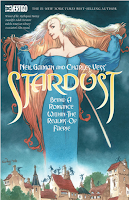Stardust by Neil Gaiman, illustrated by Charles Vess: a review
Like many with Stardust, I watched
the film first, and fell completely in love. It’s taken too long for me to find
a copy of this book, and I’m so glad I found this beautifully illustrated copy
in the library.
Stardust
follows Tristran, son of a human, Dunstan, and a faerie, Una. He goes on a
quest to find and retrieve a fallen star by way of proposal to a girl in his
town, Victoria. There is also a witch called Yvaine, and three sons of the Lord
of Stormhold (ruler of Faerie). Adventure waits for all involved, alongside
trickery and scheming.
I
often got so caught up in the fairy tale wonder, I almost forgot that this
wasn’t a book for children. When Dunstan and Una had sex, it came as somewhat
of a surprise. I am genuinely impressed that a scene like that didn’t feel
massively uncomfortable to read. Sure, reading it in the library was a little
awkward, but that was more the illustration than the text itself.
I
adore the section beginning “a description”. Sometimes it’s subtlety that makes
beautiful prose, but the lack of it here is magnificent.
Rarely
do adult authors give us a genuine teenager or child, but in Stardust, I
actually felt like Tristran was an authentic seventeen-year-old. It’s when he
says that seventeen is the age at which you’re “halfway between a boy and a
man” is brilliant and refreshing. It isn’t the old ‘cusp of adulthood’ that
often appears throughout fantasy and fairy tales. While they roughly equate to
the same thing, Gaiman’s phrasing resonates with me more. It highlights that
adulthood doesn’t just come on a birthday. I’m 20, and still waiting to feel
like an actual adult.
I
feel an absolute affinity to Tristran. His awkwardness appears to manifest in
all the ways my own does. I know it’s easy to project, but I can’t help but
feel like Tristran gives me major ADHD vibes, and I adore it. By “adore” I mean
I was nearly crying in the library. I’m aware that, in all likelihood, it’s
just me projecting, but maybe others will feel the way I do.
The
marriage proposal stole my heart. I am fully aware that it’s overboard, but
it’s adorable. It really shows his age, and you get to see his naivety.
I’m
a sucker for a seventh son motif, and I love this even more because of the
names. They’re essentially First, Second Third, etc. The names are slightly
altered that that with names like Primus and Septimus, but it all boils down to
the same thing, and it works brilliantly.
I
love the way that the prose fits the illustrations. The shapes of the images
mould the way the text is laid out on the page. It’s perfectly reminiscent of
an old fairy tale book. Don’t get me wrong, I know that’s the point, but it’s
done so beautifully.
The
Star is such a fun character. I always love a dry sense of humour, and she has
it in buckets. Her dryness plays so well against Tristan’s sweet naivety. Even as
they both develop, their personalities play off each other so well.
Sometimes
I find that stories that go between multiple plots can be difficult to follow,
but this is so simple to read. At no point did I feel lost, or like I can’t
keep up. I get confused rather easily, I’ll admit, but I’m so glad that I can
enjoy and follow this with ease.
The
humour gets me every time. His interaction with the tree, and the bit about
boundaries was fantastic. This got me thinking. I wish I found more in this
book to fault, but I can’t. I can’t just adore it utterly and completely. There
should be something wrong. Anything that comes to mind is a reach. I’m
glad it’s so good. I’m not complaining, but I want you to know why I’m only
giving compliments.
The
next little bit is a spoiler, so, as always, if you don’t want spoilers, scroll
until you find the bear on a jet-ski.
While
there is a certain sense of disappointment that Tristran and Victoria don’t end
up married, it is good seeing the character development on Tristran’s part. The
scene where he tells Victoria to marry Mr Monday shows a real sense of maturity
and growth since the proposal. Though the proposal is truly the sweetest, the
growth is beautiful to see.
I’m
almost certain that this will be in my top 10 at the end of the year. So Far,
this has been my favourite read. I can foresee a lot more Neil Gaiman in my
future. The sense of wonder prevails over all of this novel, and the
characterisation is frankly beautiful. There’s a childlike glee, but it remains
a book for adults rather than children. I also want to thank Neil Gaiman for a
character like Tristran. I know it’s likely my own projections, but I still
feel that there’s a sense of ADHD in his characterisation. The way that he
talks, carries himself, and always seems distracted by something. I think it
goes without saying that I recommend this book. It’s a true pleasure to read,
and I’m certain I’ll find myself in its pages in the future.




Comments
Post a Comment